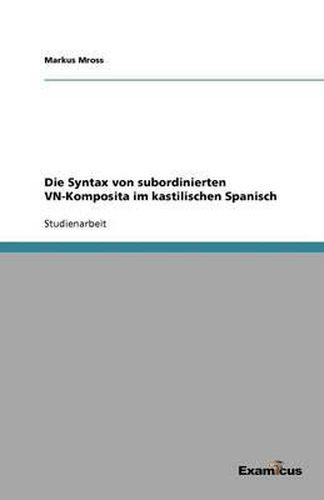Readings Newsletter
Become a Readings Member to make your shopping experience even easier.
Sign in or sign up for free!
You’re not far away from qualifying for FREE standard shipping within Australia
You’ve qualified for FREE standard shipping within Australia
The cart is loading…






This title is printed to order. This book may have been self-published. If so, we cannot guarantee the quality of the content. In the main most books will have gone through the editing process however some may not. We therefore suggest that you be aware of this before ordering this book. If in doubt check either the author or publisher’s details as we are unable to accept any returns unless they are faulty. Please contact us if you have any questions.
Studienarbeit aus dem Jahr 2003 im Fachbereich Romanistik - Spanische Sprache, Literatur, Landeskunde, Note: 0, Universitat Hamburg, Sprache: Deutsch, Abstract: Varela (1989) untersucht die Syntax von subordinierten nominalen VN-Komposita des Typs limpiabotas und tocadiscos im kastilischen Spanisch. Dabei diskutiert die Autorin die Frage, ob derartige Komposita als exozentrisch oder endozentrisch zu analysieren sind, d.h. ob die Position der Kopfkonstituente innerhalb oder ausserhalb des Kompositums anzusiedeln ist. Des Weiteren diskutiert die Autorin die Frage, ob die erste Konstituente in derartigen Komposita als Verb oder als Nomen zu analysieren ist. Diese regularen und hochproduktiven Komposita im Spanischen zeichnen sich insbesondere dadurch aus, als dass die der erste Konstituente morphologisch mit der Form eines fur die 3. Person Singular Indikativ flektierten Verbes ubereinstimmt. Derartige Komposita besitzen zumeist eine agentivische oder instrumentale Bedeutung und beziehen sich auf Individuen oder Objekte, welche typische oder gewohnheitsmassige Handlung ausfuhren. Bezuglich der Argumentstruktur dieser Komposita lasst sich feststellen, dass die zweite Konstituente syntaktisch die interne Argumentposition des Verbes realisiert, wobei die Verben unveranderlich agentivisch sind und das interne Argument syntaktisch die thematische Rolle Thema realisiert. Das Genus von nominalen VP-Komposita ist maskulin, wobei der Genus des gesamten Kompositums unabhangig vom Genus der zweiten Komponente ist. In derartigen Komposita ist die overte Manifestierung von Pluralmorphologie normalerweise ausschliesslich auf die zweite Konstituente beschrankt. […]
$9.00 standard shipping within Australia
FREE standard shipping within Australia for orders over $100.00
Express & International shipping calculated at checkout
This title is printed to order. This book may have been self-published. If so, we cannot guarantee the quality of the content. In the main most books will have gone through the editing process however some may not. We therefore suggest that you be aware of this before ordering this book. If in doubt check either the author or publisher’s details as we are unable to accept any returns unless they are faulty. Please contact us if you have any questions.
Studienarbeit aus dem Jahr 2003 im Fachbereich Romanistik - Spanische Sprache, Literatur, Landeskunde, Note: 0, Universitat Hamburg, Sprache: Deutsch, Abstract: Varela (1989) untersucht die Syntax von subordinierten nominalen VN-Komposita des Typs limpiabotas und tocadiscos im kastilischen Spanisch. Dabei diskutiert die Autorin die Frage, ob derartige Komposita als exozentrisch oder endozentrisch zu analysieren sind, d.h. ob die Position der Kopfkonstituente innerhalb oder ausserhalb des Kompositums anzusiedeln ist. Des Weiteren diskutiert die Autorin die Frage, ob die erste Konstituente in derartigen Komposita als Verb oder als Nomen zu analysieren ist. Diese regularen und hochproduktiven Komposita im Spanischen zeichnen sich insbesondere dadurch aus, als dass die der erste Konstituente morphologisch mit der Form eines fur die 3. Person Singular Indikativ flektierten Verbes ubereinstimmt. Derartige Komposita besitzen zumeist eine agentivische oder instrumentale Bedeutung und beziehen sich auf Individuen oder Objekte, welche typische oder gewohnheitsmassige Handlung ausfuhren. Bezuglich der Argumentstruktur dieser Komposita lasst sich feststellen, dass die zweite Konstituente syntaktisch die interne Argumentposition des Verbes realisiert, wobei die Verben unveranderlich agentivisch sind und das interne Argument syntaktisch die thematische Rolle Thema realisiert. Das Genus von nominalen VP-Komposita ist maskulin, wobei der Genus des gesamten Kompositums unabhangig vom Genus der zweiten Komponente ist. In derartigen Komposita ist die overte Manifestierung von Pluralmorphologie normalerweise ausschliesslich auf die zweite Konstituente beschrankt. […]